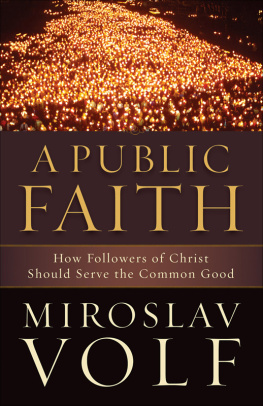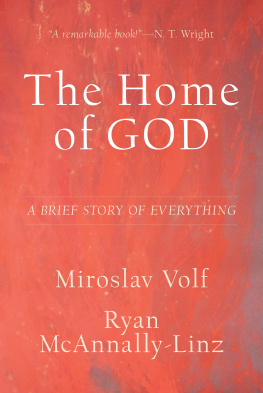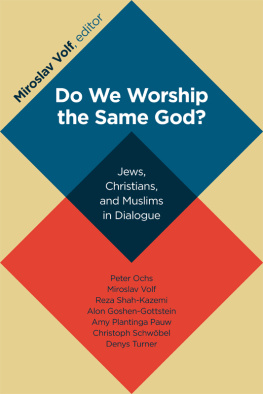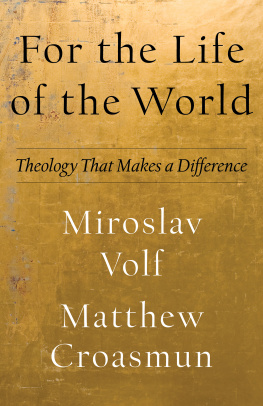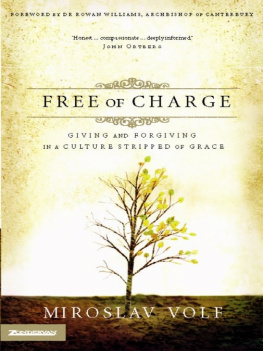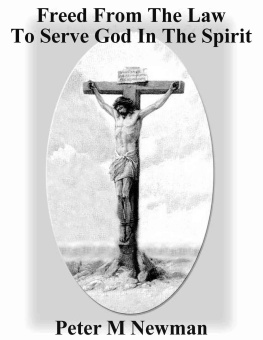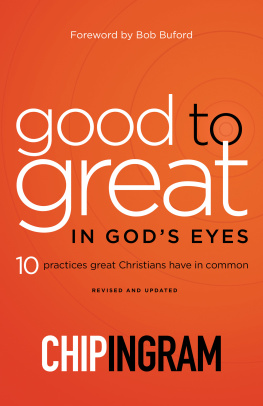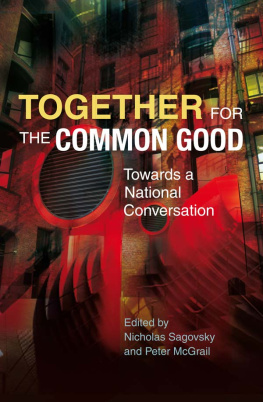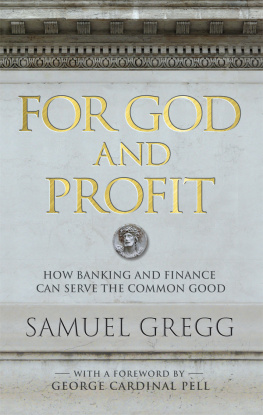Miroslav Volf - A Public Faith: How Followers of Christ Should Serve the Common Good
Here you can read online Miroslav Volf - A Public Faith: How Followers of Christ Should Serve the Common Good full text of the book (entire story) in english for free. Download pdf and epub, get meaning, cover and reviews about this ebook. year: 2011, publisher: Baker Publishing Group, genre: Religion. Description of the work, (preface) as well as reviews are available. Best literature library LitArk.com created for fans of good reading and offers a wide selection of genres:
Romance novel
Science fiction
Adventure
Detective
Science
History
Home and family
Prose
Art
Politics
Computer
Non-fiction
Religion
Business
Children
Humor
Choose a favorite category and find really read worthwhile books. Enjoy immersion in the world of imagination, feel the emotions of the characters or learn something new for yourself, make an fascinating discovery.
- Book:A Public Faith: How Followers of Christ Should Serve the Common Good
- Author:
- Publisher:Baker Publishing Group
- Genre:
- Year:2011
- Rating:5 / 5
- Favourites:Add to favourites
- Your mark:
- 100
- 1
- 2
- 3
- 4
- 5
A Public Faith: How Followers of Christ Should Serve the Common Good: summary, description and annotation
We offer to read an annotation, description, summary or preface (depends on what the author of the book "A Public Faith: How Followers of Christ Should Serve the Common Good" wrote himself). If you haven't found the necessary information about the book — write in the comments, we will try to find it.
A Public Faith: How Followers of Christ Should Serve the Common Good — read online for free the complete book (whole text) full work
Below is the text of the book, divided by pages. System saving the place of the last page read, allows you to conveniently read the book "A Public Faith: How Followers of Christ Should Serve the Common Good" online for free, without having to search again every time where you left off. Put a bookmark, and you can go to the page where you finished reading at any time.
Font size:
Interval:
Bookmark:
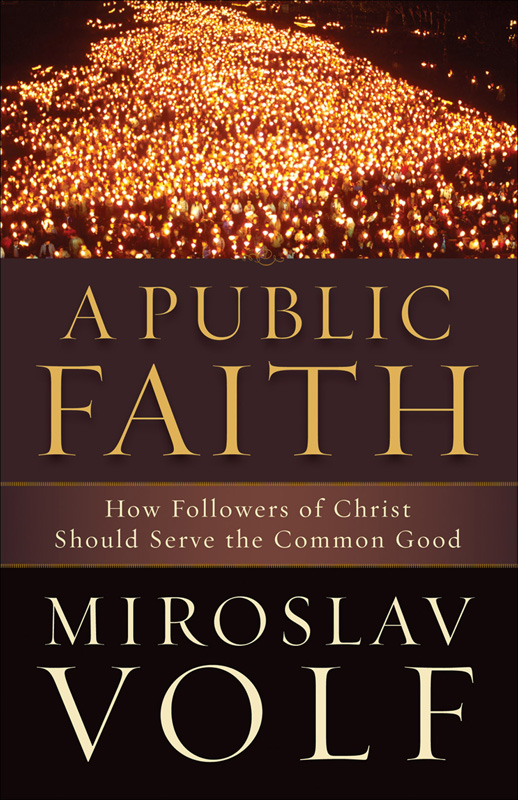

2011 by Miroslav Volf
Published by Brazos Press
a division of Baker Publishing Group
P.O. Box 6287, Grand Rapids, MI 49516-6287
www.brazospress.com
E-book edition created 2011
All rights reserved. No part of this publication may be reproduced, stored in a retrieval system, or transmitted in any form or by any meansfor example, electronic, photocopy, recordingwithout the prior written permission of the publisher. The only exception is brief quotations in printed reviews.
ISBN 978-1-4412-3207-6
Library of Congress Cataloging-in-Publication Data is on file at the Library of Congress, Washington, DC.
Scripture quotations are from the New Revised Standard Version of the Bible, copyright 1989, by the Division of Christian Education of the National Council of the Churches of Christ in the United States of America. Used by permission. All rights reserved.
The internet addresses, email addresses, and phone numbers in this book are accurate at the time of publication. They are provided as a resource. Baker Publishing Group does not endorse them or vouch for their content or permanence.
To Skip
Contents
Introduction
D ebates are raging today about the role of religions in public life, and it is not difficult to see why. First, religionsBuddhism, Judaism, Christianity, Islam, and so onare growing numerically, and their members worldwide are increasingly unwilling to keep their convictions and practices limited to the private sphere of family or religious community. Instead, they want these convictions and practices to shape public life. They may engage in electoral politics and seek to influence legislative processes (as the Religious Right has done in the United States since the Reagan presidency), or they may concentrate on transforming the moral fabric of society through religious awakening (as the Religious Right seems to be doing during the Obama presidency). Either way, many religious people aim to shape public life according to their own vision of the good life.
Second, in todays globalized world, religions cannot be neatly sequestered into separate geographic areas. As the world shrinks and the interdependence of people increases, ardent proponents of different religions come to inhabit the same space. But how do such people live together, especially when all of them want to shape the public realm according to the dictates of their own sacred texts and traditions?
When it comes to the public role of religions, the main fear is that of impositionone faith imposing aspects of its own way of life on others. Religious people fear impositionMuslims fear Christians, Christians fear Muslims, Jews fear both, Muslims fear Jews, Hindus fear Muslims, Christians fear Hindus, and so on. Secularists, those who subscribe to no traditional religious faith at all, fear imposition as wellimposition by any faithsince they tend to deem all of them irrational and dangerous.
The fear of imposition of religious views often elicits demands for the suppression of religious voices from the public square. The people espousing that view argue that politics, one major public sphere, should remain unilluminated by the light of revelation and should be guided by human reason alone, as Mark Lilla has put it recently. This is the idea of a secular state, forged over the last few centuries in the West.
Religious Totalitarianism
Unlike those who think religion should stay out of politics, I will argue in this book that religious people ought to be free to bring their visions of the good life into the public sphereinto politics as well as other aspects of public life. Whats more, I believe that it would be oppressive to prohibit them from doing so. But as soon as one starts making such an argument, some people raise the threat of religious totalitarianism.
For many secularists today, militant Islam, represented by a figure like Sayyid Qutb, shows how religions, if allowed free reign, would behave in the public realm. This represents a massive misunderstanding of religions, but it is the ghost that haunts discussions of the public role of religion. To get this ghost clearly into view, I will sketch briefly Qutbs position as articulated in Milestones , a short and revolutionary book he wrote in prison (195464), which earned him a death sentence in 1966. Qutb has been described as the godfather of radical Islam; what Marx was to Communism, it is said, Qutb has been to radical Islam. This is an exaggeration. It is true, however, that he has been the major influence on the worldview of radical movements across the Muslim world. The position that I myself will advocate in this book will be an alternative both to the secular total exclusion of all religions from public life and to Qutbs total saturation of public life with a single religion.
I am a Christian and Qutb is a Muslim. But the contrast I am drawing is not between Christian and Islamic positions. For a great majority of Muslims, Qutbs position is completely unacceptable, faithful neither to the authoritative sources of Islam nor to the centuries-long experience of Muslims with a variety of political arrangements in many parts of the world. The contrast is rather between religious political pluralism and religious totalitarianism. The position I designate here as religious political pluralism emerged within Christianity, but it is not the Christian position. Not all Christians embrace it, and some in the last few centuries have strenuously objected to it. Inversely, among people of faith, it is not Christians alone who today embrace religious political pluralism. Many Jews, Buddhists, and Muslims, among others, embrace it as well.
Here is the bare-bones sketch of Qutbs argument:
- Since there is no god but God the basic Muslim convictionGod has absolute sovereignty on earth. For traditional Jews and Christians no less than for Muslims, this is an uncontested claim. But many followers of Abrahamic religions consider the implications Qutb draws from it deeply problematic.
- That God alone is God means for Qutb that all authority of human beingswhether priests, politicians, or ordinary peopleover others is illicit. Every human authority (except that of prophet Muhammad as the mouthpiece of God) is an idol, and compromises Gods oneness and sovereignty.
- Guidance as to how to lead ones personal life and how to organize social life comes from God alone (as revealed through the prophet Muhammad). Just as the one God does not forgive any association [of another divinity] with His person, so God does not accept any association with His revealed way of life. Obeying the commands from some other source than God is as much idolatry as is worshiping another deity.
- Islam is not a set of beliefs, but a way of life in total submission to the rule of the one God. The Muslim community is the name of a group of people whose manners, ideas and concepts, rules and regulations, values and criteria, are all derived from the Islamic source.
Qutb sums up the internal constitution of the Muslim community in the following way: No god but God means no sovereignty except Gods, no law except from God, and no authority of one man over another, as the authority in all respects belongs to God. A community that embraces these principles as a way of life is a Muslim community. It is exclusive and its rules regulate all aspects of its members lives. This is its internal constitution. What about its external relations?
Next pageFont size:
Interval:
Bookmark:
Similar books «A Public Faith: How Followers of Christ Should Serve the Common Good»
Look at similar books to A Public Faith: How Followers of Christ Should Serve the Common Good. We have selected literature similar in name and meaning in the hope of providing readers with more options to find new, interesting, not yet read works.
Discussion, reviews of the book A Public Faith: How Followers of Christ Should Serve the Common Good and just readers' own opinions. Leave your comments, write what you think about the work, its meaning or the main characters. Specify what exactly you liked and what you didn't like, and why you think so.

